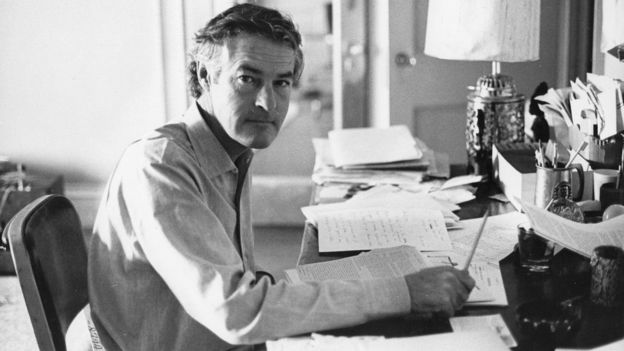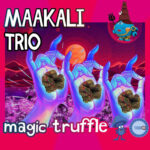The discovery of LSD and what it has to do with the day of the bicycle
Several studies have found that psychedelics may be useful in treating mental illnesses such as depression, addiction or post-traumatic stress disorder in cases where other treatments have failed.
Now, a group of British researchers plans to start the largest investigation so far in this field in order to analyze if any of the hallucinogenic drugs could be more effective than a reference drug for the treatment of depression.
“Revolutionary potential”
Scientists at Imperial College London University will compare the effectiveness of psilocybin, a psychoactive compound present in hallucinogenic mushrooms, with that of an antidepressant drug based on escitalopram, belonging to the group of serotonin reuptake inhibitors.
“Psychedelics have a revolutionary potential and that is not an exaggeration,” says Dr. Robin Carhart-Harris, who will lead the study.
But this is not the first time that scientists have been excited about these mind-altering substances.
During the 50s and 60s, it was believed that psychedelic drugs had promising potential to treat many mental disorders and more than a thousand studies were made.
But the substances quickly became very controversial.

By popularizing the recreational use of psychedelic drugs, especially the LSD that was driven in part by musicians and celebrities of the 60s, they were associated with the countercultural movements of the time.
The unusual story after the discovery of LSD and what it has to do with the day of the bicycle
The press paid attention to the bad experiences with these drugs and the supposed moral degeneration they induced and, on the contrary, they did not cover the developments with them in the field of research.
Some scientists, one of the best known was the psychologist at Harvard University Timothy Leary, spoke of the benefits of drugs in an almost evangelical way, making the line between science and its defense of its use blurred.
Thus, the fear of security and the growing moral panic surrounding these drugs caused these substances to be declared illegal in the United States in 1968.
In 1971, a UN convention on drugs put an end to scientific research with psychedelics: it made member states consider them illegal and classify them as type 1 drugs, which have no medicinal benefits.
And for decades LSD stopped being investigated: scientists turned to other areas, such as the development of antidepressants.
The resurgence of psychedelic studies
As studying with psychedelic drugs became extremely complicated and scientists needed special permits from governments, many turned their attention to psilocybin, which is a drug similar to LSD but not so controversial.

Although some pioneering studies on the potential of psychedelic drugs were made during the 1990s, it was not until the mid-2000s that there was a kind of “rebirth” in their research, thanks in part to several Johns Hopkins University studies. of the United States.
His academics found that psilocybin reduced depression in 80% of patients with lethal cancer.
Also, on the other hand, they found that it was much more effective in getting people to stop smoking than the treatments available at the time, when it was combined with cognitive-behavioral therapies, which link thought and behavior.
In 2009, Dr. Robin Carhart-Harris, who will now lead the new research, became the first Briton to return to studying psychedelic drugs in 40 years.
In several experiments he observed how psilocybin affects the human brain.
And among other things, his team found that this compound can “restart” the brains of people suffering from intractable depression.
What can psilocybin do?

According to the study published in the journal Scientific Reports, this drug affects two parts of the brain: the amygdala, which is very involved in how we process emotions such as fear and anxiety, and the default neuronal network (RND), which is a set of brain regions that collaborate with each other and that have to do with a large part of the activity developed while the mind is at rest.
Although it is still unknown exactly how psilocybin affects the brain, Carhart-Harris believes that it “turns on” the mind and pushes it out of its stiffness, allowing people to get out of deep-rooted and self-destructive thought patterns.
With the support of a therapist, those who do the treatment can then “recalibrate in a healthier way, so you check your beliefs, assumptions and addictions,” says the specialist.
The risks
Although psilocybin is not considered toxic to the body, people who consume it may have “bad trips” that can be scary and could put them in danger due to lack of control.
Its use could also exacerbate other underlying mental problems and could cause psychotic reactions in a person who already has a predisposition to suffer them.
That is why clinical trials with these substances are very rigorous: there is a great difference between the use of these substances recreationally and their use in a scientific experiment.
Researchers use pure medical grade drugs, offer advice and support during the experience, and exclude people at risk of having a psychotic reaction.
The studies so far have been small and short, and without placebo groups.
But even if the new experiments show that the use of psilocybin is safe and effective, it is likely to take at least five years before the compound gets a license for medical use.
The process for approving new drugs is notoriously slow, expensive and bureaucratic, says James Rucker, a professor at the Institute of Psychiatry at King’s College London University.
But even if the new clinical trials confirm that psychedelics may be effective in treating depression, according to Carhart-Harris, medication could not be for any patient.
“Some people do not want to go down into the depths of their soul or encounter the demons or traumas they have experienced, or face dark aspects of our human condition that we all have inside,” he says.
Rucker qualifies that no psychiatric treatment works for everyone.
“What it’s about is having a range of possibilities that you can offer,” he says.
“And this could be one of those alternatives, who knows, let’s see what the evidence says.”
Check out our range of magic truffles and magic mushroom grow kits — they’re chock full of psilocybin!





